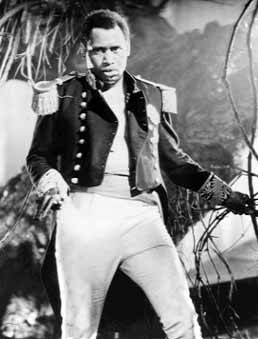


video series review by Chris Norton |

Paul Robeson in Song of Freedom. (©1998 KINO ON VIDEO. All rights reserved.) Song of Freedom was Paul Robeson's first film in England. Robeson decided to make films in England because "In America, the color question is too acute, and prejudice is rampant. A serious Negro artist stands very little chance there." It was also the first film where he demanded and received right to "final cut." The film finds John Zinga, a dockworker played by Robeson, being discovered by a European opera impresario who hears him singing on the street. Zinga is at first hesitant to try his hand at singing for a living, but he soon sees it as a way to travel to Africa and discover his ancestral roots, which he knows nothing about. He soon becomes a great success on the stage but quickly gives it up when he learns that he is a descendent of royalty from the African island of Casanga. Zinga travels to the island with his wife and a black servant. Upon arriving, he declares he is their long lost king. The natives resist his ascension as the ruling spiritualists deny his claim. Zinga is disturbed by the primitive conditions of his homeland and has dreams of uplifting his people by combining the positive aspects of western technology with the best of traditional African ways. He tries to heal a sick native only to have him die. Zinga is blamed for the death. During a ritual to bring rain to the drought stricken island, Zinga's wife intrudes and receives a death sentence for seeing what no native woman is allowed to see. As they prepare to sacrifice her, Zinga sings the "King" song that he vaguely remembers from his childhood and, in the process, removes all doubt as to his claims to the throne. The wife is spared and Zinga is recognized as their king. Strangely, the film ends with Zinga back in England for a final performance acting out his part of king in song. Robeson had hoped this film would dispel myths about the African people as being backwards and stupid, and he ultimately felt this film served that purpose. However, modern critics have attacked this film for its simplistic view of native African religion and its strong endorsement of the British colonial doctrine. This is best demonstrated in Zinga's attempts to modernize the native Africans. However, these criticisms miss several important features of the film, not the least of which was Robeson's own power in approving the final cut. In addition, the movie contains nightmarish images of slave trade in its opening sequence. As with most of Robeson's English productions, interracial camaraderie and coexistence are portrayed openly, a fact that never would have appeared in American films of the period. The film is probably the first example of openly expressed black and African pride in an English language film. It also depicts Zinga and his wife in intimate moments--something that American productions were not willing to do. Perhaps the most interesting facet of the film was the way it foreshadowed Robeson's own quest for his history and heritage. Robeson first found success with his voice (as did Zinga in Song of Freedom) and would later travel to Africa in a quest to better understand his blackness and get in touch with the African heritage denied him by America. Song of Freedom contains many memorable musical numbers including "Sleepy River" and "Song of Freedom" and the transfer to video has been done with great care. Using a modern perspective, there is much to criticize in the film, but the film is still a delight to watch for its premise, its songs, and its earnestness in aim.
|